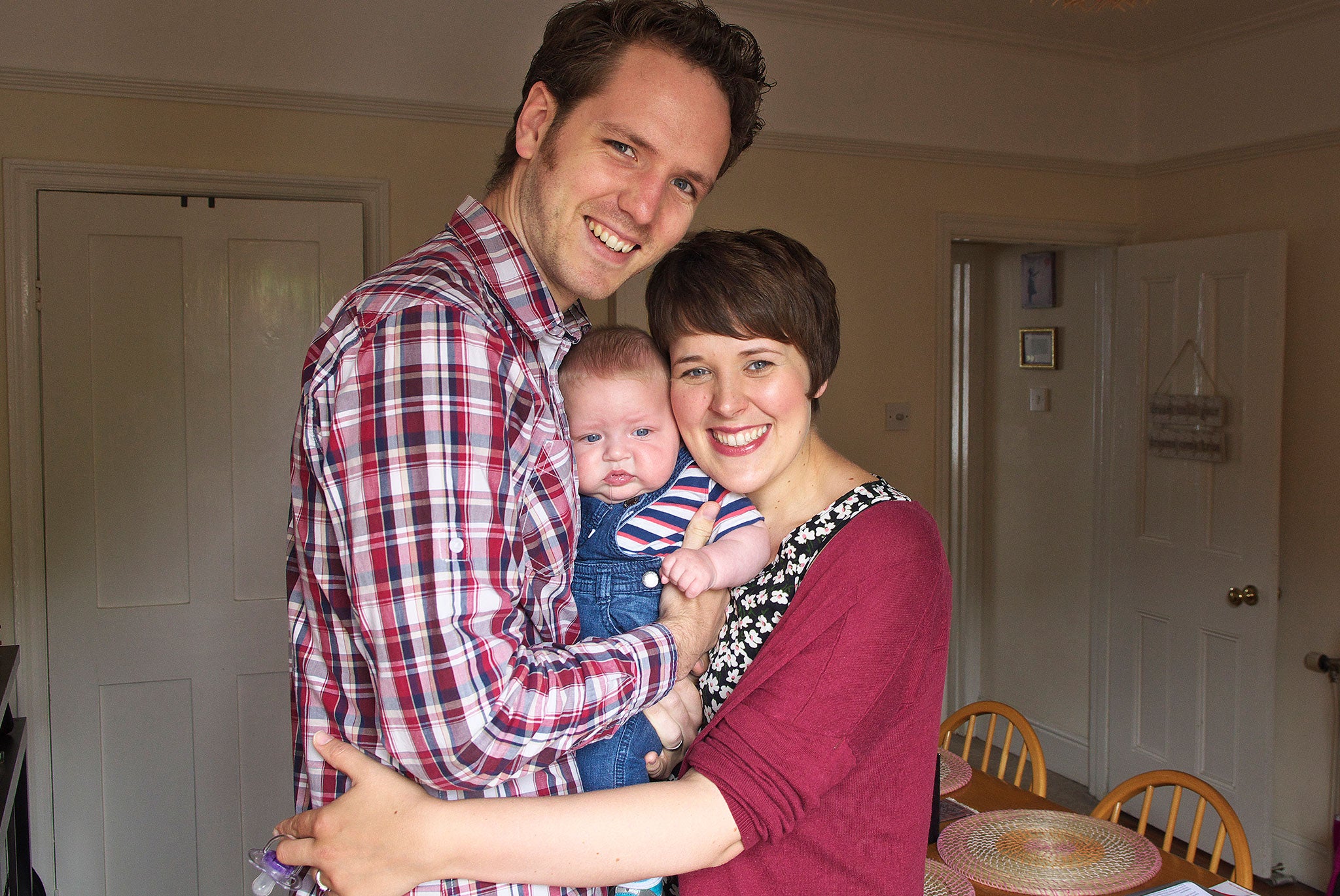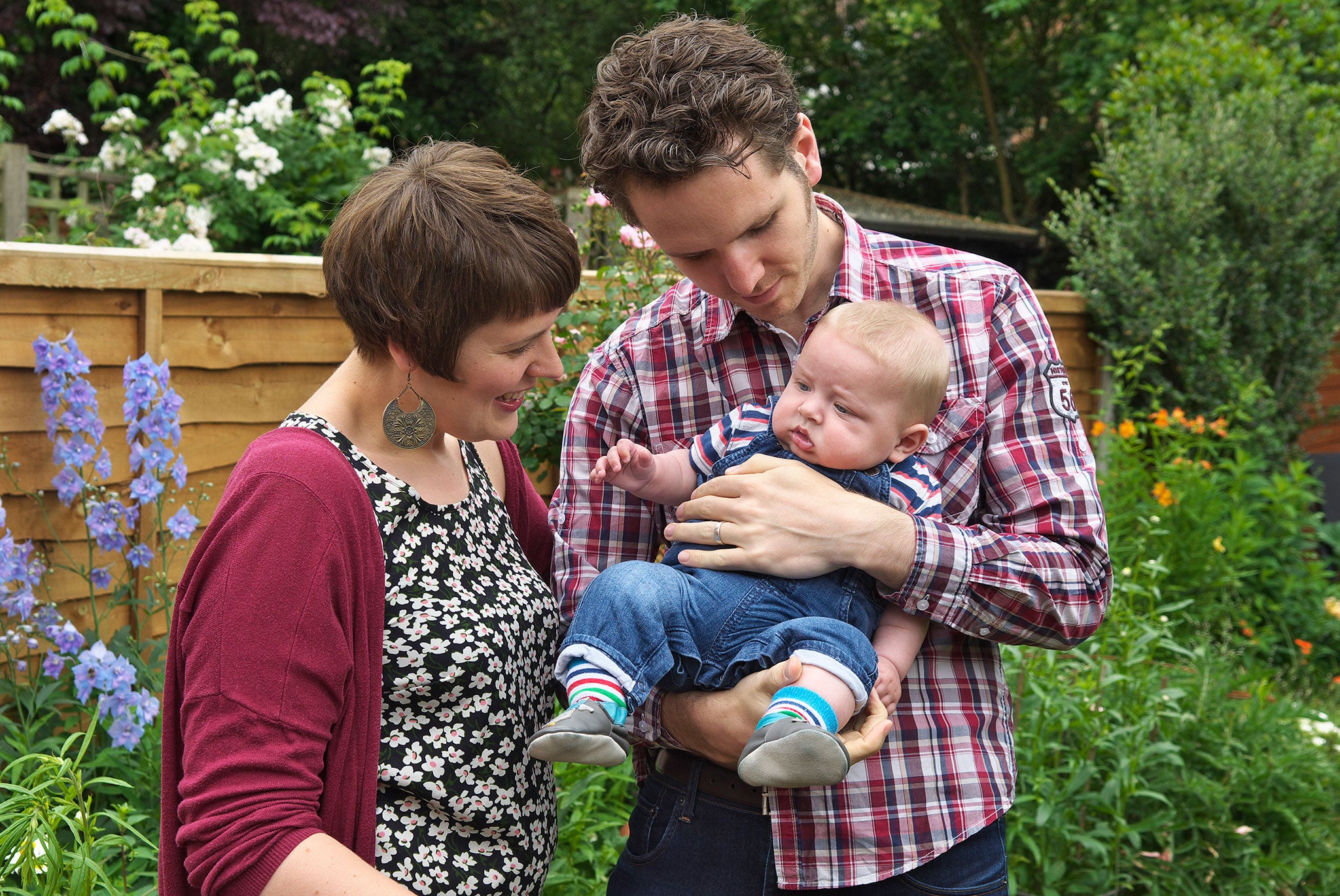Postpartum psychosis: How Jessica Pidsley was driven to the edge by the rare illness
Three days after giving birth, Jessica Pidsley was driven to the edge by postpartum psychosis. She describes how she lost and then regained control

It’s 16 February 2014 and 30-year-old Jessica Pidsley has slept for only nine hours in 11 days. She nurses her newborn son Albert for a final time before some of the strongest psychiatric drugs available renders her milk undrinkable.
She is hoarse from incessant screaming and switching between different voices. Her arms are sore from being restrained after violent outbursts towards medical staff and her family.
She has lost control over her body as savage verbal and physical Tourettes symptoms fill her hospital room with involuntary shouts, fits and physical tics.
She is terrified of an imagined “Thing” outside the door. Nevertheless, she begins repeating a mantra that will see her through two months as an inpatient. “I am Jessica. I have postpartum psychosis. It is not my fault.”
Two weeks previously, Jessica was in perfect health, enjoying a career as an actress, comedian and writer and at the end of a straightforward pregnancy with her actor husband Matthew Bannister.
“I describe Albert’s first weeks as ‘peace and war’,” she says. “The birth was gentle; I delivered Albert myself in a pool in our dining room. I remember looking down as he was born, seeing this baby blinking up at me under the water, and feeling such love. Then came a tidal wave of terror.”
The first days of parenthood were the blur of joy and shock common to most. “It was a time of epic contradictions: you’ve lost so much of yourself and you’ve never been more whole,” Jessica explains. Yet by day three she began to display symptoms of a rare illness affecting one to two in every 1,000 UK mothers.
“I’d heard about hormones going crazy,” says Matthew, “but I didn’t know what was normal. Jess started to fly off the handle in an increasingly unreasonable way. The scariest thing was that when she was in that state, it was nearly impossible to calm her down.”
“I hadn’t slept for more than a few minutes since Albert was born,” Jessica recalls. “Already, the illness was making me fearful of sleeping; it was latching on to ordinary ‘new mum’ anxieties and vastly distorting them.
It turned out I was already having delusions – seeing things that simply weren’t there. If Matt looked at me with a concerned expression, I’d see a grotesque and terrifying face instead.”
As Dr Lucinda Green, a perinatal psychiatrist, explains: “Postpartum psychosis is less common than ‘baby blues’ or postnatal depression, but is a much more severe illness. The condition swiftly escalates and requires urgent psychiatric treatment.”
According to the Royal College of Psychiatrists, symptoms most commonly start within two weeks of birth. Women with a history of bipolar disorder or psychotic illness have a high risk of postpartum psychosis, but for many it strikes with no warning.
A week after Albert’s birth, he was admitted to hospital for jaundice. Though this was a disturbing upheaval for the deteriorating Jessica, being in hospital is something that they now believe may have saved her life.
“I was becoming manic. I couldn’t stop talking, tweeting, texting and writing on the journey ... Then I became confused, distressed and didn’t cope well once Albert was admitted.”
Doctors quickly became concerned for her wellbeing, suggesting she might be suffering from postnatal depression. Jessica was convinced otherwise: “I knew it wasn’t depression. It was something wholly other. It felt like oblivion.”
Ten days after the birth, a diagnosis of postpartum psychosis was confirmed and crisis nurses raced to get her admitted to a specialist mother and baby unit before her escalating illness led to her being sectioned.

“The psychosis would not let me go. It wanted me to die. I couldn’t eat, sleep, wash or stop myself ranting, being violent and switching between fear and ecstasy,” states Jessica.
“I had been trying to get out of the hospital and go to the unit voluntarily for 12 hours. I knew I needed to get there but ‘The Thing’ wanted to stop me getting help. I was convinced it was waiting for me outside the hospital room.”
Just trying to leave the room brought on fits and terror attacks, but eventually her fear of having her baby taken from her prevailed.
In what her husband describes as “the biggest single act of will” he has ever seen, Jessica created an imagined scenario in which they were all actors filming a fictional scene about leaving the hospital. “I put on a song and directed everybody out of the room and into the car, telling people off if they didn’t walk in character. It was the only way I could cope.”
The journey was difficult. “Jess was angry and struggling in the very claustrophobic space in the back of the car,” Matthew recalls. “She was screaming at me that she was going to hit me. I was terrified that the nurses were going to have to call the police and the consequences for Jess could have been catastrophic.”
They reached the safety of the Margaret Oates Mother and Baby Unit in Hackney, east London, just in time, and Jessica started eight weeks of intensive treatment including “One Flew Over the Cuckoo’s Nest quantities of medication” to level out the extreme mood swings and bring hallucinations under control. Intensive talking therapy and exercises such as yoga and baby massage were offered, alongside a highly structured routine to aid the process.
As Dr Green explains, Jessica was lucky to find herself in a place where “staff have expertise in treating new mothers with severe mental illness, while helping them to develop confidence in caring for their baby, and supporting bonding.
"Unfortunately, we only have about three quarters of the mother and baby unit beds we need nationally. The alternative is an acute psychiatric ward, which means separating mother and child.
"Though the vast majority of women with postpartum psychosis fully recover, the condition is serious – and suicide, though very rare, remains a leading cause of maternal death in the UK. It’s vital that women have access to specialist care.”
Four months after giving birth to both Albert and her psychosis, Jessica was back at home, feeling well again and beginning to process what had happened to her. “I believe love played the biggest part in my recovery. It was a fight, but my love for Albert, the love I felt from Matt, my family, friends and the medical staff, my positivity – and of course the drugs – meant that I won.”
She is now using her huge archive of notes and recordings made in the midst of her illness to inspire a blog, as she attempts to understand what happened to her and to raise awareness of the condition. “People need to know that mental illnesses happen indiscriminately and also that you can get through it,” she explains.
“I named my blog Mutha Courage two days before I went into labour, not knowing how apt the title would become. Even in psychosis I had one eye on the experience as a writer and artist; I knew it would be an amazing story. I mean, who has a week with a homebirth at the beginning and psychosis at the end?
One of my fears in the depths of my illness was losing the story and the insights as I unravelled, so I obsessively recorded every tiny detail.
“I fought for my life and for my son,” she adds, “and I know I can do anything now.”
To read Jessica’s blog, go to mutha courage. Follow her on Twitter at @muthacourage
For support and information on postpartum psychosis go to app-network.org
Join our commenting forum
Join thought-provoking conversations, follow other Independent readers and see their replies
Comments
Bookmark popover
Removed from bookmarks